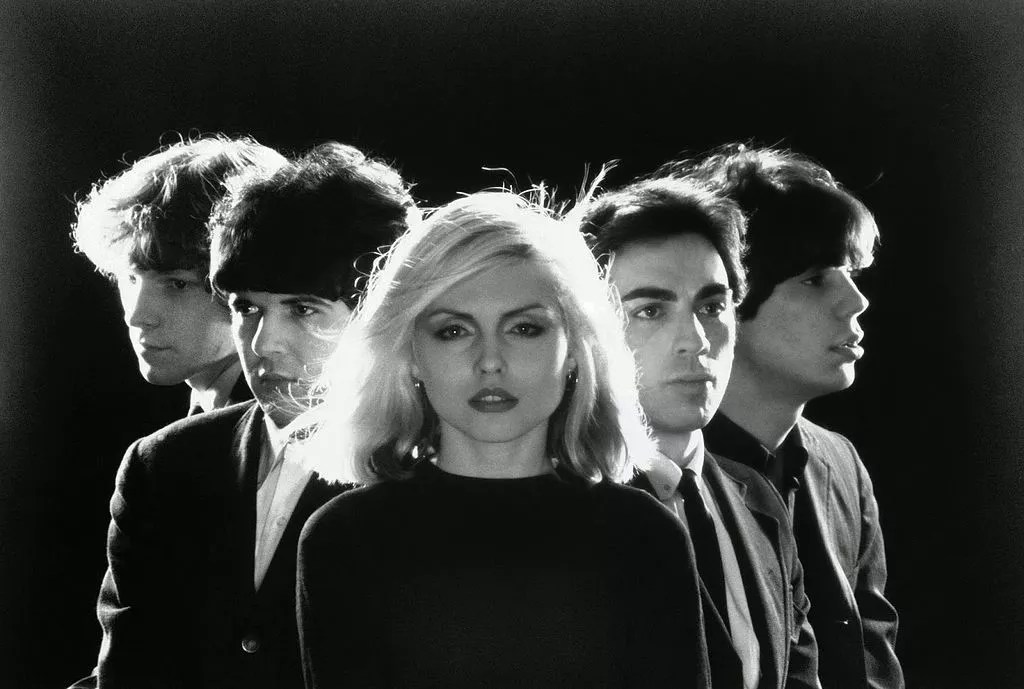
Private Stock Records, Public domain, via Wikimedia Commons

Audio By Carbonatix
Debbie Harry doesn’t have a heart of glass, but she can make her face look as smooth and impenetrable as plexiglass when the moment calls for it.
You can see this in filmmaker Meghan Fredrich’s hilarious short film Deborah Harry Does Not Like Interviews, a 17-minute long supercut of the Blondie frontwoman coolly parrying and ignoring one terrible interview question after another. You’d probably develop one hell of a poker face too if everyone kept you asking what it’s like to be the punk Marilyn Monroe.
Harry’s distinctive New York voice is warm and unguarded over the phone. The singer/songwriter is gearing up for a book tour to promote Face It, a hybrid of memoir and interviews conducted by music journalist Sylvie Simmons. She’ll be coming to the Orpheum Theatre on Saturday, October 5, to do a panel discussion event organized by Changing Hands Bookstore and Zia Records with Blondie partner Chris Stein and visual artist Rob Roth.
Face It chronicles Harry’s rise, fall, and re-emergence, charting a course from her early years in groups like The Wind in the Willows and the Stilettos to her coming into her own in Blondie. After years of having other people talk about her time in New York City’s legendary punk scene, she’s finally telling her side of the story, which gets heavy at times. Face It spends as much time talking about Harry’s lows (bankruptcy, band breakups, heroin addiction, partner Chris Stein’s near-fatal struggles with the skin disease pemphigus) as it does discussing the high points of her rock ‘n’ roll life.
We recently got a chance to talk with Harry about working with Simmons, Videodrome, and how she feels about her band’s punk legacy.
Phoenix New Times: How did your collaboration with Sylvie Simmons come about?
Debbie Harry: She met my manager on a flight and they got to talking. You know, she’s a journalist and she did that Leonard Cohen book. It seemed like she would be a really good person to talk to. She was very thought-provoking. We talked for quite a long while. She had a bad accident where she injured her wrist and her arm, so we had to take a lot of breaks.
In the press release for this book, you were quoted as saying that writing this book made you realize that you’ve lived a full life. Considering just how much you’ve done, was it a challenge to try and condense that into a single volume? Did having Simmons as a sounding-board/interviewer help you organize the book and remember important details that you may have forgotten without some outside prompting?
I’ve written a lot of songs, but not something like this. So it definitely helped put things together chronologically. Our two styles of thought worked well together.
Your memoir covers some pretty harrowing and deeply personal material. Was it easier to open up and talk about these subjects with a female journalist?
Yes, probably. And you know, looking back at it now, I think that this book might appeal more to girls and women than men, but it’s up for grabs.
When Blondie hit it big, you had already been working as a musician for quite a while in the Stilettos, The Wind in the Willows, and grinding it out for years in Blondie. Do you think that gave you some valuable perspective, that you weren’t the Next Big Thing right out the gate?
It did give me a better appreciation for how the industry works to some degree. Although with The Wind in the Willows, I was pretty much a backup singer. I wasn’t really fundamentally involved. Whereas with Blondie, I was totally involved every step of the way.
Blondie occupies kind of this strange role in New York City punk history. The group were there from the beginning, but it often seems like music history books and scene reports like Please Kill Me: The Uncensored Oral History of Punk (by Legs McNeil and Gillian McCain) minimize Blondie’s contributions to that moment in history. It often seems like Blondie gets typecast as Johnny-come-latelys to punk, along with Talking Heads. How do you feel about that perception?
We weren’t making obviously punk music. I think that’s where that sort of confusion comes from. We were there, really there, from the very start. And punk became the title for a sound when it was really a time period. I think that’s where people get confused. The real thing about the punk was the attitude and not, necessarily, a specific sound. I certainly don’t think Television reminds me of Stiv Bators – and actually, The Dead Boys came along much later. But The Ramones, Patti Smith, Talking Heads, and Television were all doing something totally different from each other. It’s just sort of in the eye of the beholder – whoever was writing that piece, what music they relate to in the scene becomes the scene.

Debbie Harry’s radiant legacy as a punk/New Wave icon is in little danger of fading away
William Kaner
Aside from your musical pursuits, you’ve also done a lot of acting on film and TV. I was wondering: How did your performance in Videodrome come about?
David [Cronenberg] sent me the script and asked me if I’d be interested in the role of Nicki. I was always fascinated with his worldview, so I was thrilled that he even thought of me. It was very exciting. When I got the script, though, there was no ending. He hadn’t written the ending yet. So I just sort of went into on good faith that it would all work out.
You’ve mentioned in past interviews that you’re thinking of writing more memoirs in the future. Do you have any idea what the next book would cover?
Now that I’ve got involved in this process, I realized that I should do a whole second book that is anecdotes and interviews with people. Interviews between me and friends and people I’ve known over the years that are still alive. Because we all remember something different and it’s really hard to remember everything. Things keep popping up.
I just spoke with a journalist from Florida and he asked me, “What do you remember about the good old days in Miami?” And I just said that I remember playing at different clubs and some good parties. But then, after I hung up, I thought of a few more things. Memory can be fleeting.
Debbie Harry: In Conversation with Chris Stein and Rob Roth is scheduled for 7 p.m. on Saturday, October 5, at Orpheum Theatre. Tickets are available via Changing Hands.